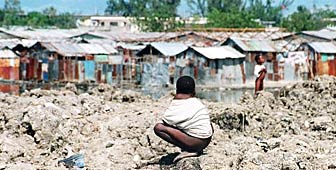Rules of globalisation have to change, ILO chief says

The director-general of the International Labour Organisation has called for a strong social pillar to be built into globalisation. Juan Somavia told swissinfo he was optimistic that the poverty, unemployment and social exclusion could be resolved.
Somavia said that the rules of globalisation, currently being discussed at a United Nations summit in Geneva, would need to be changed.
“If we want the Social Summit to work, we have to change the policies that have accompanied globalisation,” Somavia said in an exclusive interview with swissinfo. “We have the political capacity to do it.”
Somavia was one of the driving forces behind the UN Social Summit in Copenhagen in 1995. The special session of the UN General Assembly in Geneva is looking at the progress that has been made in attaining the goals set out five years ago.
The answer is: very little. Instead of Copenhagen plus five, many have been calling the conference Copenhagen minus five.
He says that the Social Summit in the Danish capital came up with the right policies, “but it was banging its head against the brick wall of the global economy”.
The Chilean official is not totally mistrustful of the market. He believes that it generates wealth and encourages creativity, but certain safeguards have to be put in place.
“The market can work for the benefit of everybody. But we have to realise that there are enormous limitations with the way things are working today.”
One of the most quoted phrases at this week’s summit has been Somavia’s comment that globalisation should no longer be given the benefit of the doubt. He said back in the late 1970s – when inflation was rampant and when many countries were experiencing the transition from state production to the private sector – that there were good reasons for the balance of power to swing away from governments and towards financial institutions and business.
“The macroeconomic house had to be put in order,” Somavia says. “But that has been done now. The world now understands that a balanced budget is a good thing for society. Now we have to change the perspective. The focus has to be switched from complete deregulation to job creation, because obviously, we’ve gone too far.”
“We are told that globalisation is irreversible, that the only thing we can do is adapt to it. That’s true of the information technology revolution. But what is not irreversible are the policies that have accompanied globalisation – the macroeconomic policies, the trade policies, the social policies, the development policies. They are made by policy-makers and can be changed,” the ILO chief adds.
One of the key demands aired by some governments in Geneva is that there should be greater co-operation between UN agencies like the ILO and the international financial institutions.
The ILO is often accused of having responded too slowly to the challenges of globalisation. It is believed that a strong ILO would counterbalance the weight of the World Trade Organisation and the Bretton Woods institutions (the World Bank and the International Monetary Fund, or IMF).
But Somavia is sceptical. He says such co-operation requires the political will of governments.
“This is not a problem of the head of the IMF sitting down with the head of the ILO. This is a question of whether the governments want to have stability between the market and society, of whether they decide that it’s the dignity of human beings that has to determine the policies we put in place. In the current situation, it’s not realistic to ask these bodies to sit down and get on with it,” he told swissinfo.
Somavia believes the ILO could be a model for the kind of engagement needed to combat poverty and social exclusion. Unlike most of the other international organisations, it does not have a purely governmental structure. Rather it is a “societal” body, with representatives from government, business and trade unions.
“I believe there are enough leaders in politics, in business and at a local level who can come together to find solutions. I believe the answer has to be yes, because through the ILO I have seen governments, employers and trade unions agree on complex issues.”
“But we need to be very frank about where we see the failings and be able to raise out views beyond the next election, or the bottom line, or the next collective bargaining, I think we will find that we all want a more stable society and that we can all make a contribution,” Somavia concluded.
by Roy Probert

In compliance with the JTI standards
More: SWI swissinfo.ch certified by the Journalism Trust Initiative
You can find an overview of ongoing debates with our journalists here . Please join us!
If you want to start a conversation about a topic raised in this article or want to report factual errors, email us at english@swissinfo.ch.